Related Research Articles

The prime minister of Canada is the head of government of Canada. Not outlined in any constitutional document, the office exists only per long-established convention. Under the Westminster system, the prime minister governs with the confidence of a majority of the elected House of Commons; as such, the prime minister typically sits as a member of Parliament (MP) and leads the largest party or a coalition of parties. The prime minister is appointed by the monarch's representative, the governor general, and, as first minister, selects other ministers to form the Cabinet and chairs it. Constitutionally, executive authority is vested in the monarch, but, in practice, the powers of the monarch and governor general are nearly always exercised on the advice of the Cabinet, which is collectively responsible to the House of Commons. Canadian prime ministers are appointed to the Privy Council and styled as the Right Honourable, a privilege maintained for life.

The governor general of Canada is the federal representative of the Canadian monarch, currently King Charles III. The king or queen of Canada is also monarch and head of state of 14 other Commonwealth realms and lives in the United Kingdom. The monarch, on the advice of his or her Canadian prime minister, appoints a governor general to administer the government of Canada in the monarch's name. The commission is for an indefinite period—known as serving at His Majesty's pleasure—though, five years is the usual length of time. Since 1959, it has also been traditional to alternate between francophone and anglophone officeholders. The 30th and current governor general is Mary Simon, who was sworn in on 26 July 2021. An Inuk leader from Nunavik in Quebec, Simon is the first Indigenous person to hold the office.

The Senate of Canada is the upper house of the Parliament of Canada. Together with the Crown and the House of Commons, they compose the bicameral legislature of Canada.
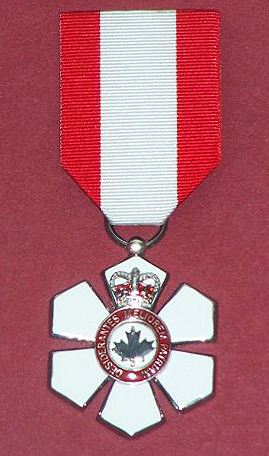
The Order of Canada is a Canadian state order and the second-highest honour for merit in the system of orders, decorations, and medals of Canada, after the Order of Merit.

Roméo-Adrien LeBlanc was a Canadian journalist and politician who served as Governor General of Canada from 1995 to 1999, the 25th since Canadian Confederation.
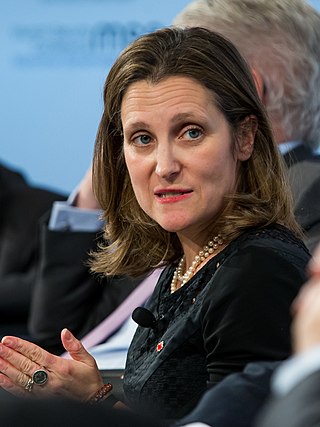
The deputy prime minister of Canada is a minister of the Crown and a member of the Canadian Cabinet. The office is conferred at the discretion of the prime minister and does not have an associated departmental portfolio. Canadian deputy prime ministers are appointed to the Privy Council and styled as the Honourable, a privilege maintained for life.
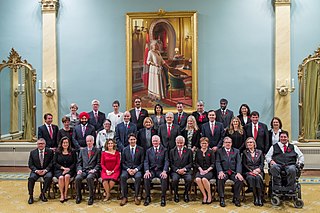
The Cabinet of Canada is a body of ministers of the Crown that, along with the Canadian monarch, and within the tenets of the Westminster system, forms the government of Canada. Chaired by the prime minister, the Cabinet is a committee of the King's Privy Council for Canada and the senior echelon of the Ministry, the membership of the Cabinet and Ministry often being co-terminal; as of November 2015 there were no members of the latter who were not also members of the former.

The chief justice of Canada is the presiding judge of the nine-member Supreme Court of Canada, the highest judicial body in Canada. As such, the chief justice is the highest-ranking judge of the Canadian court system. The Supreme Court Act makes the chief justice, a Crown in Council appointment, meaning the Crown acting on the advice of the prime minister and minister of justice. The chief justice serves until they resign, turn 75 years old, die, or are removed from office for cause. By tradition, a new chief justice is chosen from among the court's incumbent puisne justices.

Julie Payette is a Canadian engineer, scientist and former astronaut who served from 2017 to 2021 as Governor General of Canada, the 29th since Canadian Confederation.

The King's Privy Council for Canada, sometimes called His Majesty's Privy Council for Canada or simply the Privy Council (PC), is the full group of personal consultants to the monarch of Canada on state and constitutional affairs. Practically, the tenets of responsible government require the sovereign or his viceroy, the governor general of Canada, to almost always follow only that advice tendered by the Cabinet: a committee within the Privy Council composed usually of elected members of Parliament. Those summoned to the KPC are appointed for life by the governor general on the advice of the prime minister of Canada, meaning that the group is composed predominantly of former Cabinet ministers, with some others having been inducted as an honorary gesture. Those in the council are accorded the use of an honorific style and post-nominal letters, as well as various signifiers of precedence.
The Government of Canada is the body responsible for the federal administration of Canada. The term Government of Canada refers specifically to the executive, which includes ministers of the Crown and the federal civil service ; it is alternatively known as His Majesty's Government and is corporately branded as the Government of Canada. There are over 100 departments and agencies, as well as over 300,000 persons employed in the Government of Canada. These institutions carry out the programs and enforce the laws established by the Parliament of Canada.
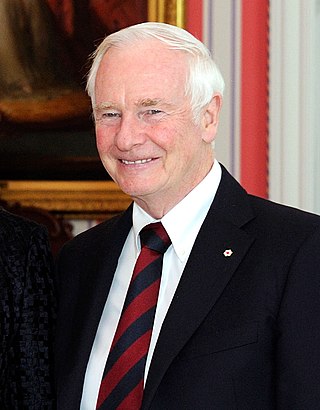
David Lloyd Johnston is a Canadian academic, author, and statesman who served from 2010 to 2017 as Governor General of Canada, the 28th since Canadian Confederation. Johnston was the special rapporteur appointed to investigate reports of foreign interference in recent Canadian federal elections until his resignation on June 9, 2023.
The orders, decorations, and medals of Canada comprise a complex system by which Canadians are honoured by the country's sovereign for actions or deeds that benefit their community or the country at large. Modelled on its British predecessor, the structure originated in the 1930s, but began to come to full fruition at the time of Canada's centennial in 1967, with the establishment of the Order of Canada, and has since grown in both size and scope to include dynastic and national orders, state, civil, and military decorations; and various campaign medals. The monarch in right of each Canadian province also issues distinct orders and medals to honour residents for work performed in just their province. The provincial honours, as with some of their national counterparts, grant the use of post-nominal letters and or supporters and other devices to be used on personal coats of arms.
Judicial appointmentsin Canada are made by the federal government or provincial government. Superior and federal court judges are appointed by federal government, while inferior courts are appointed by the provincial government.

Alberta is the only Canadian province to hold elections for nominees to be appointed to the Senate of Canada. These elections are non-binding, as the appointment of senators is solely the responsibility of the Governor General of Canada on the advice of the Prime Minister.
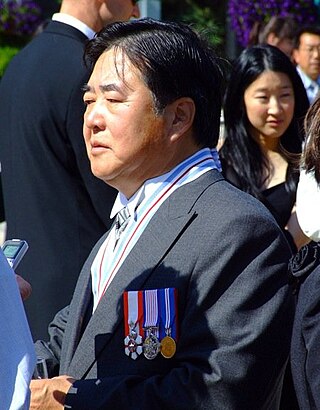
Philip Siu Lun Lee was the 24th lieutenant governor of Manitoba. He was made a Member of the Order of Canada in 1999 and received the Queen's Golden Jubilee Medal in 2002.
The Canadian secretary to the King is the senior operational member of the royal household for the monarch of Canada, presently King Charles III. The office was established as Canadian secretary to the Queen in 1959. The present office holder is Donald Booth, who was appointed to the position in 2019.
Prorogation is the end of a parliamentary session in the Parliament of Canada and the parliaments of its provinces and territories. It differs from a recess or adjournment, which do not end a session; and differs from a complete dissolution of parliament, which ends both the session and the entire parliament, requiring an election for the House of Commons in the bicameral federal parliament and the singular legislative chamber of the unicameral provincial parliaments.

The premiership of Justin Trudeau began on November 4, 2015, when the first Cabinet headed by Justin Trudeau was sworn in by Governor General David Johnston. Trudeau was invited to form the 29th Canadian Ministry and become Prime Minister of Canada following the 2015 election, where Trudeau's Liberal Party won a majority of seats in the House of Commons of Canada, defeating the Conservative Prime Minister Stephen Harper's government. In both federal elections of 2019 and 2021, Trudeau was re-elected with minority governments; with his party losing the popular vote twice.

The 2020–2021 Rideau Hall workplace review was an external review by Quintet Consulting of the workplace culture at Rideau Hall—which hosts the governor general of Canada and her staff—initiated by the Privy Council Office (PCO) following allegations of harassment and verbal abuse by Governor General Julie Payette and her secretary, Assunta di Lorenzo. The review ultimately produced a report in January 2021 concluding that Payette and Di Lorenzo presided over a toxic work environment, resulting in their resignations on January 21.
References
- ↑ "Queen Elizabeth without Canadian secretary as Liberal government mulls future of job".
- ↑ Canada News Centre. "Governor General Consultation Committee". Queen's Printer for Canada. Archived from the original on 28 September 2011. Retrieved 6 August 2010.
- ↑ Galloway, Gloria; Ibbitson, John (8 July 2010), "Next governor-general unveiled", The Globe and Mail, retrieved 10 July 2010
- 1 2 "David Johnston: a worthy viceroy", The Globe and Mail, 9 July 2010, archived from the original on 10 September 2010, retrieved 9 July 2010
- 1 2 Curry, Bill (11 July 2010), "Selection panel ordered to find non-partisan governor-general: PMO", The Globe and Mail, archived from the original on 16 July 2010, retrieved 11 July 2010
- ↑ [3] [4] [5]
- ↑ Ditchburn, Jennifer (28 June 2010), "Tight circle of monarchists helping Harper pick next Governor General", Winnipeg Free Press, archived from the original on 8 July 2010, retrieved 10 July 2010
- ↑ Office of the Prime Minister of Canada (8 July 2010). "PM welcomes appointment of David Johnston as Governor General Designate". Queen's Printer for Canada. Archived from the original on 12 July 2010. Retrieved 8 July 2010.
- ↑ Gillespie, Kevin (29 December 2015), Osgoode Constitutional Law Society — Crown & Constitution Speakers' Series: Monarchy in Action, Philosophia regis, retrieved 29 December 2015
- ↑ [4] [8] [9]
- 1 2 3 4 Office of the Prime Minister of Canada (4 November 2012). "Terms of reference: Advisory Committee on Vice-Regal Appointments". Queen's Printer for Canada. Archived from the original on 5 October 2013. Retrieved 4 November 2012.
- ↑ Cheadle, Bruce (4 November 2012), Harper creates new panel to ensure 'non-partisan' vice regal appointments, The Canadian Press, archived from the original on 7 February 2013, retrieved 4 November 2012
- ↑ Office of the Prime Minister of Canada (4 November 2012). "PM announces new Advisory Committee on Vice-Regal Appointments". Queen's Printer for Canada. Archived from the original on 6 November 2012. Retrieved 4 November 2012.
- ↑ Harper, Stephen (15 October 2022), "The Crown at the end of the second Elizabethan age", National Post, retrieved 27 March 2023
- ↑ Beeby, Dean (19 September 2017), Liberals leave royal position vacant in Queen's Sapphire Jubilee year, CBC News, retrieved 11 August 2023
- ↑ "Trudeau consults Queen on process for picking a new governor general". CBC News. 11 June 2021. Retrieved 12 June 2021.
- ↑ Messamore, Barbara J. (26 January 2021). "What the Payette episode teaches us about fit and the Governor General". Policy Options. Retrieved 12 June 2021.
- ↑ Minister LeBlanc announces advisory group to assist with the selection of the next Governor General, 12 March 2021
- ↑ "Short list of potential governor general candidates will go to Trudeau in 'next few days'". National Post. Canadian Press. 10 June 2021. Retrieved 12 June 2021.
- ↑ Feldman, Stephanie (19 April 2021), The Evolution of the Selection and Appointment of the Governor General, Library of Parliament, retrieved 11 August 2023
- ↑ Office of the Prime Minister of Canada (6 July 2021), Prime Minister announces The Queen’s approval of Canada’s next Governor General, Queen's Printer for Canada, retrieved 11 August 2023